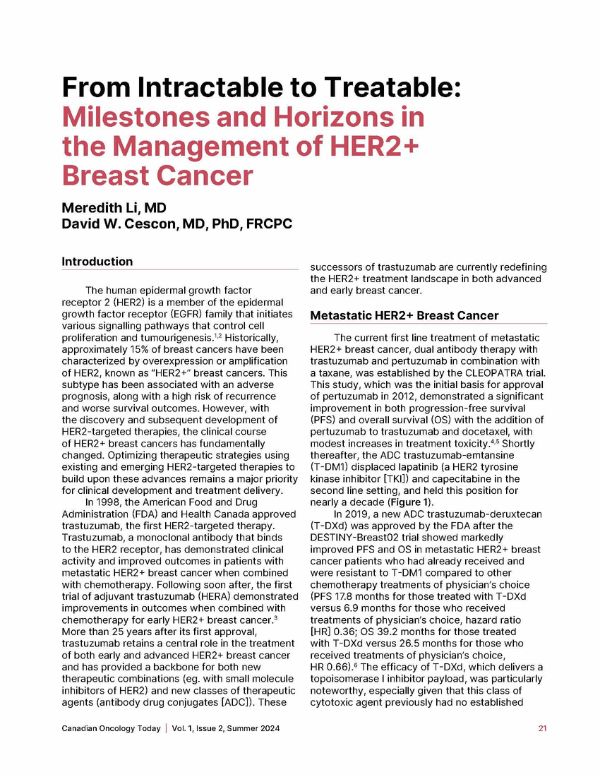From Intractable to Treatable: Milestones and Horizons in the Management of HER2+ Breast Cancer
DOI:
https://doi.org/10.58931/cot.2024.1222Abstract
The human epidermal growth factor receptor 2 (HER2) is a member of the epidermal growth factor receptor (EGFR) family that initiates various signalling pathways that control cell proliferation and tumourigenesis. Historically, approximately 15% of breast cancers have been characterized by overexpression or amplification of HER2, known as “HER2+” breast cancers. This subtype has been associated with an adverse prognosis, along with a high risk of recurrence and worse survival outcomes. However, with the discovery and subsequent development of HER2‑targeted therapies, the clinical course of HER2+ breast cancers has fundamentally changed. Optimizing therapeutic strategies using existing and emerging HER2-targeted therapies to build upon these advances remains a major priority for clinical development and treatment delivery.
In 1998, the American Food and Drug Administration (FDA) and Health Canada approved trastuzumab, the first HER2-targeted therapy. Trastuzumab, a monoclonal antibody that binds to the HER2 receptor, has demonstrated clinical activity and improved outcomes in patients with metastatic HER2+ breast cancer when combined with chemotherapy. Following soon after, the first trial of adjuvant trastuzumab (HERA) demonstrated improvements in outcomes when combined with chemotherapy for early HER2+ breast cancer. More than 25 years after its first approval, trastuzumab retains a central role in the treatment of both early and advanced HER2+ breast cancer and has provided a backbone for both new therapeutic combinations (eg. with small molecule inhibitors of HER2) and new classes of therapeutic agents (antibody drug conjugates [ADC]). These successors of trastuzumab are currently redefining the HER2+ treatment landscape in both advanced and early breast cancer.
References
Karunagaran D, Tzahar E, Beerli RR, Chen X, Graus-Porta D, Ratzkin BJ, et al. ErbB-2 is a common auxiliary subunit of NDF and EGF receptors: implications for breast cancer. EMBO J. 1996;15(2):254-264. DOI: https://doi.org/10.1002/j.1460-2075.1996.tb00356.x
King CR, Kraus MH, Aaronson SA. Amplification of a novel v-erbB-related gene in a human mammary carcinoma. Science. 1985; 229(4717):974-976. doi: 10.1126/science.2992089 DOI: https://doi.org/10.1126/science.2992089
Piccart-Gebhart MJ, Procter M, Leyland-Jones B, Goldhirsch A, Untch M, Smith I, et al. Trastuzumab after adjuvant chemotherapy in HER2-positive breast cancer. N Engl J Med. 2005;353(16):1659-1672. doi:10.1056/NEJMoa052306 DOI: https://doi.org/10.1056/NEJMoa052306
Baselga J, Cortes J, Kim SB, Im SA, Hegg R, Im YH, et al. Pertuzumab plus trastuzumab plus docetaxel for metastatic breast cancer. N Engl J Med. 2012;366(2):109-119. doi:10.1056/NEJMoa1113216 DOI: https://doi.org/10.1056/NEJMoa1113216
Swain SM, Baselga J, Kim SB, Ro J, Semiglazov V, Campone M, et al. Pertuzumab, trastuzumab, and docetaxel in HER2-positive metastatic breast cancer. N Engl J Med. 2015;372(8):724-734. doi:10.1056/NEJMoa1413513 DOI: https://doi.org/10.1056/NEJMoa1413513
Andre F, Park YH, Kim SB, Takano T, Im SA, Borges G, et al. Trastuzumab deruxtecan versus treatment of physician’s choice in patients with HER2-positive metastatic breast cancer (DESTINY-Breast02): a randomised, open-label, multicentre, phase 3 trial. Lancet. 2023;401(10390):1773-1785. doi: 10.1016/S0140-6736(23)00725-0 DOI: https://doi.org/10.1016/S0140-6736(23)00725-0
Hurvitz SA, Hegg R, Chung WP, Im SA, Jacot W, Ganju V, et al. Trastuzumab deruxtecan versus trastuzumab emtansine in patients with HER2-positive metastatic breast cancer: updated results from DESTINY-Breast03, a randomised, open-label, phase 3 trial. Lancet. 2023;401(10371):105-117. doi: 10.1016/S0140-6736(22)02420-5 DOI: https://doi.org/10.1016/S0140-6736(22)02420-5
Murthy RK, Loi S, Okines A, Paplomata E, Hamilton E, Hurvitz SA, et al. Tucatinib, trastuzumab, and capecitabine for HER2-positive metastatic breast cancer. [published correction appears in N Engl J Med. 2020 Feb 6;382(6):586]. N Engl J Med. 2020;382(7):597-609. doi:10.1056/NEJMoa1914609 DOI: https://doi.org/10.1056/NEJMx190039
Hurvitz SA, Loi S, O’Shaughnessy J, Okines AFC, Tolaney SM, Sohn J, et al. HER2CLIMB-02: primary analysis of a randomized, double-blind phase 3 trial of tucatinib and trastuzumab emtansine for previously treated HER2-positive metastatic breast cancer. Cancer Res. 2021;81(4_Supplement): OT-28-01. doi: 10.1158/1538-7445.SABCS20-OT-28-01 DOI: https://doi.org/10.1158/1538-7445.SABCS20-OT-28-01
Tolaney SM, Tarantino P, Graham N, Tayob N, Pare L, Villacampa G, et al. Adjuvant paclitaxel and trastuzumab for node-negative HER2-positive breast cancer: final 10-year analysis of the open-label, single-arm, phase 2 APT trial. Lancet Oncol. 2023;24(3):273-285. doi: 10.1016/S1470-2045(23)00051-7 DOI: https://doi.org/10.1016/S1470-2045(23)00051-7
Gianni L, Pienkowski T, Im YH, Roman L, Tseng LM, Liu MC, et al. Efficacy and safety of neoadjvuant pertuzumab and trastuzumab in women with locally advanced, inflammatory, or early HER2-positive breast cancer (NeoSphere): a randomized multicentre, open-label phase 2 trial. Lancet Oncol. 2012;13(1):25-32. doi: 10.1016/S1470-2045(11)70336-9 DOI: https://doi.org/10.1016/S1470-2045(11)70336-9
Gianni L, Pienkowski T, Im YH, Tseng LM, Liu MC, Lluch A, et al. 5-year analysis of neoadjuvant pertuzumab and trastuzumab in patients with locally advanced, inflammatory, or early-stage HER2-positive breast cancer (NeoSphere): a multicentre, open-label, phase 2 randomized trial. Lancet Oncol. 2016;17(6):791-800. doi: 10.1016/S1470-2045(16)00163-7 DOI: https://doi.org/10.1016/S1470-2045(16)00163-7
von Minckwitz G, Huang CS, Mano MS, Loibl S, Mamounas EP, Untch M, et al. Trastuzumab emtansine for residual invasive HER2-positive breast cancer. N Engl J Med. 2019;380(7):617-628. doi:10.1056/NEJMoa1814017 DOI: https://doi.org/10.1056/NEJMoa1814017
Piccart M, Procter M, Fumagalli D, de Azambuja E, Clark E, Ewer MS, et al. Adjuvant pertuzumab and trastuzumab in early HER2-positive breast cancer in the APHINITY trial: 6 years’ follow-up. J Clin Oncol. 2021;39(13):1445-1457. doi: 10.1200/JCO.20.01204 DOI: https://doi.org/10.1200/JCO.20.01204
Loibl S, Mano MS, Untch M, Huang CS, Mamounas EP, Wolmark N, et al. Phase III study of adjuvant ado-trastuzumab emtansine vs trastuzumab for residual invasive HER2-positive early breast cancer after neoadjuvant chemotherapy and HER2-targeted therapy: KATHERINE final IDFS and updated OS analysis. Presented at: San Antonio Breast Cancer Symposium, San Antonio, USA, December 5-9, 2023. Available from: https://medically.roche.com/content/dam/pdmahub/restricted/oncology/sabcs-2023/SABCS-2023-presentation-loibl-phase-iii-study-of-adjuvant-ado.pdf DOI: https://doi.org/10.1158/1538-7445.SABCS23-GS03-12
Prat A, Guarneri V, Pascual T, Braso-Maristany F, Sanfeliu E, Pare L, et al. Development and validation of the new HER2DX assay for predicting pathological response and survival outcome in early-stage HER2-positive breast cancer. EBioMedicine. 2022;75:103801. doi: 10.1016/j.ebiom.2021.103801 DOI: https://doi.org/10.1016/j.ebiom.2021.103801
Cescon DW, Bratman SV, Chan SM, Siu LL. Circulating tumour DNA and liquid biopsy in oncology. Nat Cancer. 2020;1(3):276-290. doi:10.1038/s43018-020-0043-5 DOI: https://doi.org/10.1038/s43018-020-0043-5

Published
How to Cite
Issue
Section
License
Copyright (c) 2024 Canadian Oncology Today

This work is licensed under a Creative Commons Attribution-NonCommercial-NoDerivatives 4.0 International License.
